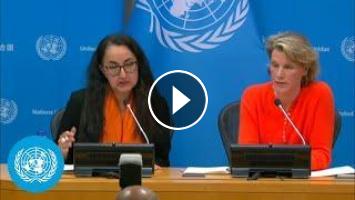Leyla Sharafi, Chief of the Gender and Human Rights Branch, UNFPA and Emilie Filmer-Wilson, Human Rights Adviser at UNFPA brief reporters on UNFPA’s 2024 State of the World's Population Report.
------------------------
The 2024 State of the World’s Population Report released today (17 Apr) “highlights an unfortunate truth,” as the progress made in sexual and reproductive health and rights over the past 30 years “has not been enjoyed equally,” according to a top official from the United Nations sexual and reproductive health agency (UNFPA).
Leyla Sharafi, who is the Chief of the Gender and Human Rights Branch at UNFPA, said, “we need to shift our strategies if we are to achieve the Sustainable Development Goals by 2030.”
According to the Report, African women are 130 times more likely to die due to pregnancy or childbirth complications than women in Europe and Northern America.
Talking to reporters in New York, Sharafi said, “the harsh reality is that socioeconomic status, ethnic identity, race, sexuality, and disabilities, among other factors, too often determine whether a person can live a safe and healthy reproductive life. This is a global trend, but it requires national solutions led by governments.”
Interwoven Lives, Threads of Hope: Ending inequalities in sexual and reproductive health and rights, reveals that more than half of all preventable maternal deaths occur in countries which are in a state of crisis or distress. It highlights the role that racism, sexism and other forms of discrimination play in blocking progress on sexual and reproductive health issues.
Sharafi said, “since 2016, there has been zero progress in the annual reduction in maternal deaths, and 13 countries have seen rollbacks in women's ability to exercise bodily autonomy.”
This concerning trend, she said, “applies to countries across the economic spectrum,” including the United States, where “we see failures in medical care for Black women who are three times more likely to die giving birth than their white counterparts.”
Asked to expand on the issue of reproductive rights in the US, the UNFPA official said, “where abortion is legal, we say it should be safe and accessible. Post abortion services, however, must be available no matter the legal status of abortion. One thing that UNFPA is vocal about is that we have to acknowledge the facts, and this is something that, is very important. Evidence shows that unsafe abortion is a leading contributor to maternal death globally, and overall abortion rates tend to decline only in countries where it is broadly legal.”
According to the Report, progress is slowing down or stalled in several key areas. In a world where a quarter of women cannot say no to sex with their partner and nearly one in ten have no say over contraception, 800 women die every day giving birth – a disturbing figure that has remained unchanged since 2016.
Nearly 500 of those preventable deaths per day are happening in countries living through humanitarian crises and conflicts.
------------------------
The 2024 State of the World’s Population Report released today (17 Apr) “highlights an unfortunate truth,” as the progress made in sexual and reproductive health and rights over the past 30 years “has not been enjoyed equally,” according to a top official from the United Nations sexual and reproductive health agency (UNFPA).
Leyla Sharafi, who is the Chief of the Gender and Human Rights Branch at UNFPA, said, “we need to shift our strategies if we are to achieve the Sustainable Development Goals by 2030.”
According to the Report, African women are 130 times more likely to die due to pregnancy or childbirth complications than women in Europe and Northern America.
Talking to reporters in New York, Sharafi said, “the harsh reality is that socioeconomic status, ethnic identity, race, sexuality, and disabilities, among other factors, too often determine whether a person can live a safe and healthy reproductive life. This is a global trend, but it requires national solutions led by governments.”
Interwoven Lives, Threads of Hope: Ending inequalities in sexual and reproductive health and rights, reveals that more than half of all preventable maternal deaths occur in countries which are in a state of crisis or distress. It highlights the role that racism, sexism and other forms of discrimination play in blocking progress on sexual and reproductive health issues.
Sharafi said, “since 2016, there has been zero progress in the annual reduction in maternal deaths, and 13 countries have seen rollbacks in women's ability to exercise bodily autonomy.”
This concerning trend, she said, “applies to countries across the economic spectrum,” including the United States, where “we see failures in medical care for Black women who are three times more likely to die giving birth than their white counterparts.”
Asked to expand on the issue of reproductive rights in the US, the UNFPA official said, “where abortion is legal, we say it should be safe and accessible. Post abortion services, however, must be available no matter the legal status of abortion. One thing that UNFPA is vocal about is that we have to acknowledge the facts, and this is something that, is very important. Evidence shows that unsafe abortion is a leading contributor to maternal death globally, and overall abortion rates tend to decline only in countries where it is broadly legal.”
According to the Report, progress is slowing down or stalled in several key areas. In a world where a quarter of women cannot say no to sex with their partner and nearly one in ten have no say over contraception, 800 women die every day giving birth – a disturbing figure that has remained unchanged since 2016.
Nearly 500 of those preventable deaths per day are happening in countries living through humanitarian crises and conflicts.
- Category
- United Nations
- Tags
- UN, United Nations, UNGA
Be the first to comment













